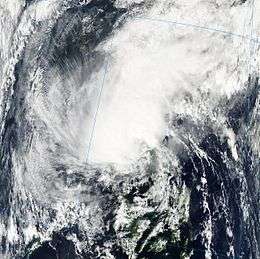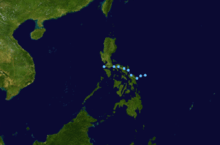Tropical Depression Winnie
| Tropical depression (JMA scale) | |
|---|---|
 Tropical Depression Winnie over the Philippines | |
| Formed | November 27, 2004 |
| Dissipated | November 29, 2004 |
| Highest winds |
10-minute sustained: 55 km/h (35 mph) |
| Lowest pressure | 1000 hPa (mbar); 29.53 inHg |
| Fatalities | 1,593 total |
| Damage | $14.6 million (2004 USD) |
| Areas affected | Philippines |
| Part of the 2004 Pacific typhoon season | |
Tropical Depression Winnie was a weak, but catastrophic tropical cyclone that killed nearly 1,600 people after triggering widespread flooding in the Philippines.
Meteorological history

Tropical Depression Winnie was first identified by the Philippine Atmospheric, Geophysical and Astronomical Services Administration on November 27 as a tropical depression east of the Philippines. A poorly organized cyclone, the Joint Typhoon Warning Center briefly issued a Tropical Cyclone Formation Alert on November 29. Tracking west-northwestward, Winnie made landfall in southern Luzon.[1] Upon moving over land, the depression attained its peak intensity with winds of 55 km/h (35 mph) and a barometric pressure of 1000 mbar (hPa; 29.53 inHg).[2] Once over land, the system began to weaken before entering the South China Sea. Once over water, Winnie turned northwest, moving along the western Luzon coastline throughout November 29. Early the following day, advisories on the depression ceased. Winnie was last noted off the northwestern coast of Luzon.[1]
Impact
| Deadliest Philippine typhoons | ||||||||||||||||||||||||||||||||||||||||||||||||||||||||||||
|---|---|---|---|---|---|---|---|---|---|---|---|---|---|---|---|---|---|---|---|---|---|---|---|---|---|---|---|---|---|---|---|---|---|---|---|---|---|---|---|---|---|---|---|---|---|---|---|---|---|---|---|---|---|---|---|---|---|---|---|---|
| ||||||||||||||||||||||||||||||||||||||||||||||||||||||||||||
Although a weak tropical cyclone, Tropical Depression Winnie brought torrential rainfall to much of the Visayas and Luzon. Initial estimates stated that at least 300 people were killed by the storm.[1] However, over time, it was discovered that at least 842 people perished and 751 others were missing, a total of 1,593 people.[4] Damage from the depression was estimated at 678.7 million Philippine pesos ($14.6 million USD).[5]
Aftermath
Not long after Winnie devastated the central Philippines, the country was struck by another, more powerful tropical cyclone. Typhoon Nanmadol worsened the situation caused by Winnie and killed another 70 people.
Retirement
Due to the extreme death toll caused by the storm in the Philippines, the name "Winnie" was later retired. The name was replaced with "Warren".
See also
- Other Philippines tropical cyclones that claimed more than 1,000 lives
- Typhoon Bopha (Pablo, 2012)
- Typhoon Haiyan (Yolanda, 2013), deadliest tropical cyclone to strike the Philippines in recent recorded history
- Tropical Storm Washi (Sendong, 2011)
- Typhoon Fengshen (Frank, 2008)
- Typhoon Durian (Reming, 2006)
- Tropical Storm Thelma (Uring, 1991)
- Other storm in the Philippines
References
- 1 2 3 Gary Padgett (March 27, 2005). "Monthly Tropical Weather Summary for November 2004". Typhoon 2000. Retrieved May 21, 2010.
- ↑ Gary Padgett (January 4, 2005). "Monthly Tropical Cyclone Tracks: November 2004". Typhoon 2000. Retrieved May 21, 2010.
- ↑ Pedro Ribera, Ricardo Garcia-Herrera and Luis Gimeno (July 2008). "Historical deadly typhoons in the Philippines". Weather. Royal Meteorological Society. 63 (7): 196. doi:10.1002/wea.275.
- ↑ Agence France-Presse (December 10, 2004). "Philippine storms dead and missing toll nears 1,600". ReliefWeb. Retrieved May 21, 2010.
- ↑ http://wb.pagasa.dost.gov.ph/index.php?option=com_content&task=view&id=167&Itemid=176&limit=1&limitstart=23
